
Back in October I was deciding whether or not to get a digital TV converter boxes. The main reason for wanting one was so I could watch season five of LOST without having to wait until the next day to watch it online. Then Congress, in their infinite wisdom, decided to push the digital TV date back from February 17 to June 12. My problem was solved – at least for four months. I ended up watching LOST and forgot about the entire digital television switch until Friday when Marathon Girl called and mentioned that the kids couldn’t find the one afternoon TV show they watch because of the switch.
"How are they handling it?" I asked.
"Fine," Marathon Girl said. "They’re playing with trains instead."
Over the weekend we talked about buying a digital converter box so we could at least get local channels (which is somewhat risky considering that the TV signal we did get was good but not great) or getting a satellite dish. In the end we decided not to do anything – at least for now. It’s not a question of expense but whether or not a converter box or a satellite TV would even be worth it considering that our viewing habits don’t involve sitting in front of the boob tube flitting through channels deciding what to watch.
With the exception of LOST all the other shows we watch take place on Friday or Saturday night via Hulu or DVD. If there’s a new series we’ve heard a lot about, we’ll go online and watch an episode or two to see if it’s worth continuing to watch online or put in our Netflix queue. In the last year we’ve watched Battlestar Galactica, The Sarah Conner Chronicles, The Office, Moonlight, the HBO miniseries John Adams, and a handful of other programs this way.
And we’ve really come to prefer it – especially for exciting, well-written shows like Battlestar Galactica where we can get two or three episodes done in one sitting instead of spacing them out a week at a time. Even things like local news, which a decade ago I watched with religiously, are better online. Instead of sitting through a 30 minute newscast, I can pick the stories – If any – I want to watch when I want to watch them. A decade from now I wouldn’t be surprised if most people watch TV online as opposed to tuning in and watching it live and TV networks do away with things like fall lineups and instead start shows at odd times.
The solution isn’t perfect. Sometimes I have to close my office door when the guys at work are talking about a show I haven’t caught up on – or even seen – yet. But even if I overhear a spoiler or two, I’ll take the freedom that comes with watching shows online or on DVD over having 100+ channels to surf through. I get more writing done and spend more time with the family. And I can learn to live without the live sporting that may catch my eye.
I have no idea what I’ll do when the final season of LOST comes around. At some point I’ll probably be overwhelmed with the desire to watch it live and Marathon Girl and I will have this debate in about six months or so. But odds are we’ll end up watching it on Hulu the next day.
I'll learn to live with it.
It’s a small price to pay for freedom that comes with it.



